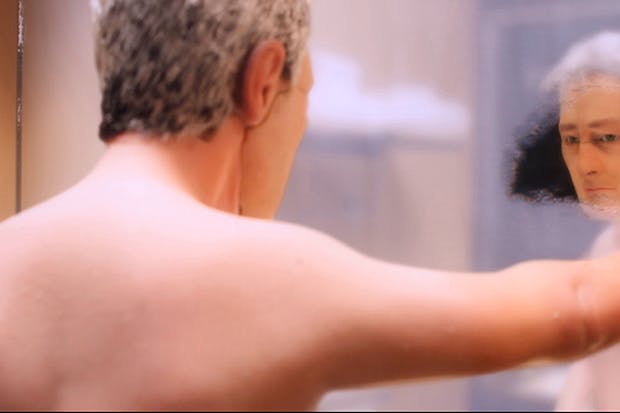Anomalisa is an animated film written by Charlie Kaufman, and while the temptation is to label it a midlife crisis movie, because labels make life so much easier, it is not that clear-cut, just as it never is with Kaufman, who has always refused to explain himself. (Asked what his films are about, his stock response is: ‘It’s about an hour and half.’) I can only say the more you think about this after the event — and you will think about it constantly, as it sets up a sort of thrum under your skin — the more truth and sadness and humanity you will see in it. And it’s all been achieved with stop-motion animation of the kind that CGI was meant to kill off, but thankfully didn’t. It’s the same technique as used for Wallace and Gromit, although in that instance there were never any scenes featuring one puppet going down on another in a hotel room, as far as I can remember (and you’d think I would).
Directed by Kaufman (who wrote Being John Malkovich and Eternal Sunshine of the Spotless Mind and directed Synecdoche, New York, all of which are ‘about an hour and a half’) and Duke Johnson, who specialises in stop motion, our protagonist is Michael Stone (as voiced by David Thewlis). Stone is a British customer-services expert who lives in LA and is flying to Cincinnati for a conference. Michael is a puppet, and at first you will simply marvel at this. You will marvel not just at the detail, or how his skin looks exactly like skin, but how, in being a representation, and knowing he’s a representation — he even sports a visible seam, showing where the parts of the puppet face fit together — he seems more real than if he weren’t. I’m not sure why this is. Because we are looking that much harder? Because we are noting every sigh, every gesture, every expression, and registering the remarkable human-ness of it? We certainly understand, just from the weight of his being, that Michael is weary, lonely, suffers from chronic ennui. And we share his fatigue when faced with the banalities and minor miseries of everyday life: the taxi driver who won’t stop talking, the hotel key card that won’t work and won’t work and then suddenly does. It wasn’t, in fact, until Michael arrived at this hotel that I realised that everyone he encounters looks the same and has the same voice (Tom Noonan’s).
Michael is so disconnected from other people that he can’t see anybody (I would suggest). He phones his wife, who puts their young son on the phone. They sound the same as everyone else. He hooks up with an ex whom he treated badly. She looks the same, sounds the same, walks out angrily when he suggests they go up to his room. What does Michael need? Does Michael even know what he needs? Michael takes a shower, curses it — too hot, too cold; hotel showers, another of life’s minor miseries — but as he is looking in the bathroom mirror, as if seeking the answer for himself, he hears a woman’s voice in the corridor that is distinct. ‘Jesus! Someone else!’ he cries. He frantically races to get dressed. He runs along the corridor, banging on doors, and finally he finds her. She is Lisa (voiced by Jennifer Jason Leigh).
Lisa, it turns out, is pretty ordinary. She is no beauty. She likes Cyndi Lauper and Sarah Brightman and works in a call centre. But he sees her. He hears her. She is an anomaly. She is Anomalisa. He is enraptured. Despite her own insistence that she’s not worth bothering with, he woos her. She sings ‘Girls Just Want To Have Fun’ for him, lovingly. (I know! Who’d have thought it could be a tender ballad!) He goes down on her, much to her initial dismay (she is shy; she soon perks up). The sex is not just extraordinarily tender, but also weirdly erotic. (I wish all my sex to be puppet sex from now on. Truly.)
Can Lisa, we are now wondering, save Michael? Or will his existential despair do for him? Will she end up looking and sounding like everyone else? I won’t provide answers, as I can’t, and wouldn’t even if I could. ‘Sometimes there’s no lesson and that’s a lesson in itself,’ says Michael towards the end. It’s experiencing this film that matters, and experiencing how remarkably affecting it is, and experiencing the thrum that won’t leave you be. The hotel is named ‘Fregoli’ which is, in fact, a rare psychiatric disorder in which a person believes that many different people are in fact a single person, but surely it’s life that’s gotten to Michael, rather than some neurological blip? But now we’re going back to what it’s about, which isn’t the point. That said, it’s not about an hour and a half; it’s 90 minutes, dead on.
Got something to add? Join the discussion and comment below.
Get 10 issues for just $10
Subscribe to The Spectator Australia today for the next 10 magazine issues, plus full online access, for just $10.














Comments
Don't miss out
Join the conversation with other Spectator Australia readers. Subscribe to leave a comment.
SUBSCRIBEAlready a subscriber? Log in